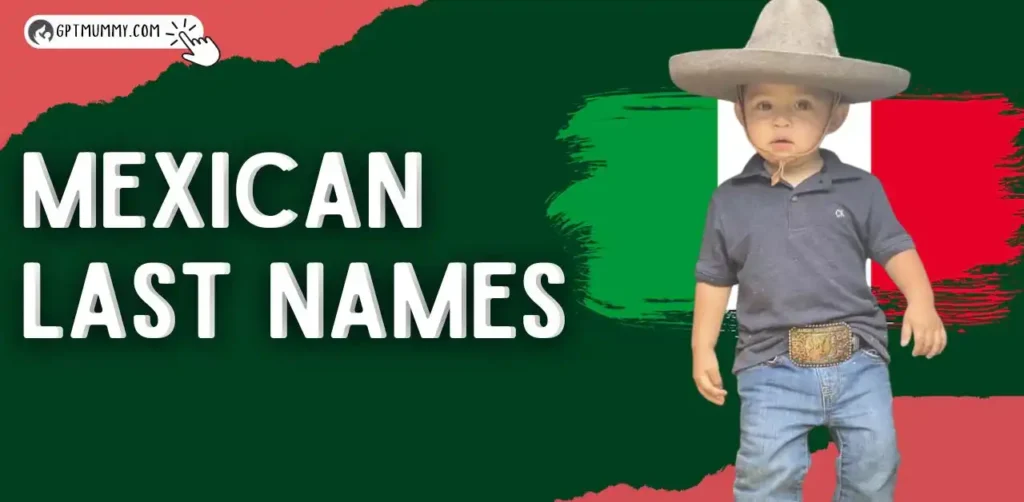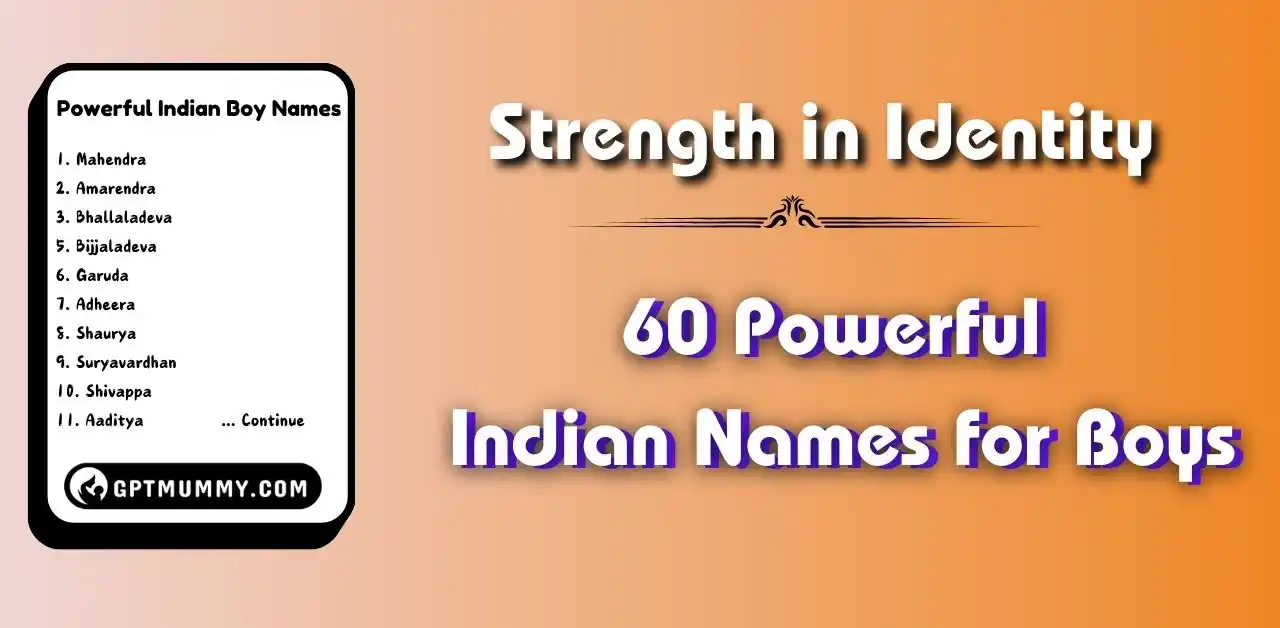Explore over 150 Mexican last names, uncovering their meanings, origins, and cultural significance. Dive into the rich history shaped by Spanish and indigenous influences, and discover the unique naming traditions that define Mexico’s vibrant identity.
Mexican Naming Traditions
Mexican naming traditions are a fascinating blend of cultures and customs, and they can be quite different from what you might be used to. Here’s a friendly guide to understanding how names work in Mexico:
First and Last Names: In Mexico, it’s common for a baby to have two first names. The first name is usually the primary name, while the second might be chosen for religious significance or family tradition. For instance, a child might be named “Maria Guadalupe” or “Jose Luis.”
Two Surnames: Unlike many Western countries, Mexicans typically use two surnames. The first surname comes from the father’s family, and the second surname comes from the mother’s family. So, if a father’s surname is “Garcia” and the mother’s is “Lopez,” their child would be named “Maria Guadalupe Garcia Lopez.”
Marriage Names: When a woman gets married, she often adds her husband’s first surname to her own, with “de” (meaning “of”) in between. For example, if Maria Guadalupe Garcia Lopez married a man with the surname “Martinez,” she would become “Maria Guadalupe Garcia de Martinez.”
Children’s Surnames: For their children, couples generally use the father’s first surname and the mother’s first surname. So, Maria Guadalupe Garcia de Martinez and her husband would have children with the surname “Martinez Garcia.”
Hyphenated Surnames: Sometimes, parents choose to hyphenate their surnames if both are considered important. This is less common but still practiced.
Patronymics and Matronymics: In some cases, names might also include patronymics (based on the father’s name) or matronymics (based on the mother’s name), adding another layer of meaning and tradition.
History of Mexican Last Names
The history of Mexican last names is a fascinating journey through cultural influences, historical events, and societal changes. Let’s look at how Mexican surnames came to be and what they signify:
Spanish Influence:
Many Mexican last names have Spanish origins due to the colonial period when Spain ruled Mexico. These names often reflect Spanish traditions and include patronymics (surnames derived from a father’s first name), such as “González” (son of Gonzalo) and “Rodríguez” (son of Rodrigo). During this time, Spanish settlers introduced their own surnames, which were then adopted and adapted by the local population.
Indigenous Roots:
Mexico’s indigenous cultures have also left a mark on naming traditions. Some Mexican surnames are derived from indigenous languages like Nahuatl, Maya, and Zapotec. For example, names like “Xochitl” (meaning “flower” in Nahuatl) reflect this rich indigenous heritage.
Cultural Fusion:
As Mexico evolved, so did its naming conventions. The blending of Spanish and indigenous cultures led to the creation of unique surnames that carry elements from both backgrounds. This fusion is a testament to the diverse cultural tapestry of Mexico.
Colonial and Post-Colonial Changes:
During the colonial era, Spanish colonial authorities established the use of surnames as a means of organizing and controlling the population. After independence from Spain in 1821, Mexico retained many of these surnames, but they were increasingly influenced by Mexican identity and pride.
Formal Structures (mexican last names order)
Mexican naming conventions traditionally involve two surnames: the first from the father and the second from the mother. This practice helps preserve both paternal and maternal family names and reflects a strong emphasis on family heritage. For instance, a child named “Luis Miguel Hernández López” has inherited “Hernández” from his father and “López” from his mother.
Modern Trends:
Today, while traditional naming practices continue, modern influences and global interactions have introduced new naming trends. Hyphenated surnames and international names have become more common, reflecting Mexico’s evolving cultural landscape.

Popular Mexican Last Names
1. Cruz
Derived from the Spanish word for “cross,” this surname signifies someone who lived near a cross or had a connection to a cross.
2. Alvarez
A patronymic surname meaning “son of Alvaro,” it reflects lineage from an ancestor named Alvaro.
3. Delgado
Originating from Spanish and Portuguese, this last name was used to describe someone who was thin or slender.
4. Castillo
This surname refers to individuals who resided near a large fortified structure, like a castle, highlighting their proximity to such landmarks.
5. Cano
This name comes from a descriptive nickname meaning “white-haired,” used to identify individuals with lighter-colored hair.
6. De Leon
A versatile surname that can be linked to either the Spanish city of Leon or used as a patronymic term meaning “son of Leon.”
7. Cuevas
This habitational name is associated with someone living near caves, particularly in the regions of Burgos and Malaga.
8. Cortes
Derived from the word “Corte,” this surname indicates a refined or courteous individual, often used as a nickname.
9. Castro
A topographic name referring to someone living near a castle or fortress, particularly in the Galicia region of Spain.
10. Aguilar
This Spanish surname signifies “haunt of eagles,” and was originally used for people living in regions associated with eagles.
11. Cisneros
Derived from “cisne,” meaning “swan,” this surname can denote someone from a place known for swans or named Cisneros in Palencia.
12. Diaz
A patronymic surname meaning “son of Diego,” it traces lineage back to an ancestor named Diego.
Quick Fact:
Common given names in Mexico often have Spanish origins. Names like José, Maria, Juan, and Ana are very popular and used frequently.
13. Fernandez
A patronymic surname meaning “son of Fernando,” it reflects descent from an ancestor named Fernando.
14. Franco
This surname originates from the name “Frank,” meaning “free,” and was used to describe individuals from the Germanic tribes around the Rhine River.
15. Garcia
A common patronymic surname meaning “son of Garcia,” which is a Spanish form of the name “Gerald,” meaning “rule of the spear.”
16. Gonzalez
A patronymic surname meaning “son of Gonzalo,” it reflects lineage from an ancestor named Gonzalo.
17. Guerrero
Derived from “guerra,” meaning “war,” this surname was used to describe a soldier or someone associated with warfare.
18. Gutierrez
A patronymic surname meaning “son of Gutierre,” it traces lineage from an ancestor named Gutierre.
19. Guzman
A topographic surname for someone from the village of Guzman in Burgos, Spain.
20. Hernandez
A patronymic surname meaning “son of Hernando” or “son of Fernando,” it reflects descent from an ancestor named Hernando or Fernando.
21. Herrera
A habitational surname indicating residence near a blacksmith forge, known as a “herreria.”
22. Ibarra
A Basque habitational name for someone who lived in a valley or plain near a river.
23. Iglesias
A habitational surname for someone who resided near a church.
24. Jimenez
A very common patronymic surname meaning “son of Jimeno,” it denotes descent from an ancestor named Jimeno.
25. Lopez
A Spanish patronymic name meaning “son of Lope,” derived from the Latin word “lupus,” meaning “wolf.”
26. Lozano
This surname comes from a nickname used to describe someone as elegant or good-looking.
27. Lugo
A habitational name for someone from the city of Lugo, located in Galicia.
28. Luna
Derived from the Latin word “lumina,” meaning “light,” this surname reflects a connection to brightness or illumination.
29. Maldonado
A habitational name for someone from the village of Maldonado in Albacete province, also used as a nickname for an “ill-favored” person.
30. Marin
This surname is derived from the Latin word “Marinus,” meaning “of the sea.”
31. Marquez
A patronymic surname meaning “son of Marcus” or “son of Marcos,” reflecting descent from an ancestor named Marcus or Marcos.
32. Martinez
A patronymic surname meaning “son of Martin,” derived from the Latin “Martinus,” related to Mars, the Roman god of war.
33. Mata
A habitational surname for someone who lived near a wood or forest.
34. Medina
A habitational name for someone residing in a city named Medina, such as Medina del Campo in Valladolid province.
35. Mendoza
A Basque topographic surname for someone living on or near a cold mountain.
36. Montoya
A Basque topographic name for someone living near hills and valleys.
37. Morales
A topographic surname for someone living near a mulberry bush.
38. Moreno
Derived from a nickname for someone with dark hair.
39. Munoz
A patronymic surname meaning “son of Muno,” with “Muno” referring to “hill.”
40. Navarro
A habitational name of Basque origin for someone from the Navarre village in Spain.
41. Ortega
A Galician surname for someone residing in the village of Ortega in the Burgos province.
42. Ortiz
A common patronymic surname meaning “son of Orton or Orta.”
43. Parra
A habitational name for someone who lived near a grapevine or trellis.
44. Perez
A patronymic surname meaning “son of Pedro or Pero.”
45. Ramirez
A patronymic name meaning “son of Ramiro.”
46. Ramos
A habitational name for someone from towns named Ramos in Spain and Portugal.
47. Reyes
Derived from the Latin word “Regis,” meaning “royal,” this surname signifies a royal or noble lineage.
48. Rios
Derived from the Spanish word “Rio,” meaning “river,” this surname denotes someone living near a river.
49. Rivera
A topographic name for someone living near a riverbank.
50. Rodrigo
Derived from the Old Germanic personal name “Hrodric,” meaning “renowned power.”
51. Rodriguez
A patronymic surname meaning “son of Rodrigo.”
52. Romero
Derived from a nickname meaning “pilgrim,” particularly one who went on religious journeys.
53. Rosas
Derived from the Latin word “rosa,” meaning “rose,” this surname reflects a connection to roses.
54. Rubio
Derived from a nickname for someone with red or light-colored hair.
55. Ruiz
A patronymic surname for “son of Ruy,” with “Ruy” meaning “powerful ruler.”
56. Sanchez
A patronymic surname for “son of Sancho,” meaning “sanctified.”
57. Soto
A topographic name for someone living near a grove or small wood.
58. Suarez
A patronymic name meaning “son of Suero or Soeiro.”
59. Torres
A topographic surname for someone living near or in a tower.
60. Vasquez
A patronymic surname meaning “son of Vasco.”
61. Vega
A topographic name for someone living near a meadow.
62. Velasco
A Basque surname meaning “raven,” originally used for someone associated with sheep-keeping.
Common Mexican Last Names
1. Rivera
This surname signifies someone who lived by a riverbank, linking their identity to the life-sustaining aspect of rivers.
2. Sánchez
Derived from the name “Sancho,” meaning “sanctified,” this surname nods to the legacy of familial sainthood.
3. Hernández
Meaning “son of Hernando” or “son of Fernando,” this surname has Germanic roots associated with bravery both in peace and war.
4. González
A patronymic name meaning “son of Gonzalo,” it relates to battle and implies a lineage of warriors.
5. Flores
From the Spanish word for “flowers,” this last name often indicates a person who lived near a flowery area or worked with flowers.
6. Jiménez
Stemming from “son of Jimeno,” this name possibly derives from the Basque word for “winner,” suggesting a victorious heritage.
7. Ramírez
Signifying “son of Ramiro,” this surname is associated with the Visigothic name meaning “famous counselor,” denoting wisdom and leadership.
8. Pérez
Meaning “son of Pedro,” this name carries a biblical association with the apostle Peter, symbolizing a rock or stone, indicative of reliability.
9. Ruiz
A short and impactful surname meaning “son of Ruy,” an old nickname for Rodrigo, hinting at famed and legendary rulers.
10. Torres
Meaning “towers,” this surname likely refers to someone who lived near or worked in a tower, symbolizing vigilance.
11. Morales
A topographic surname meaning “dweller near the mulberry tree,” reflecting a connection to the natural environment.
12. Delgado
Originating from Spanish and Portuguese, this last name was used to describe someone who was slender or thin.
13. Mendoza
A Basque surname that means “cold mountain,” indicating a person who lived near a cold or high mountain region.
14. Vargas
A surname derived from the Spanish word for “barren land” or “pasture,” suggesting someone from a rural or less fertile area.
15. Ortega
A Galician surname meaning “dweller in a place with thorns,” referring to someone living in a region characterized by thorny plants.
16. Guzmán
This surname is derived from a topographic name for someone from the village of Guzmán in Burgos, Spain, often associated with a personal name.
17. Salazar
Of Basque origin, this surname means “old hall” or “old house,” indicating a person from an old or historically significant residence.
18. Cabrera
A surname derived from the Spanish word for “goat herder,” indicating a historical occupation or association with goat farming.
19. Soto
A topographic surname meaning “dweller near a grove or small wood,” highlighting a connection to wooded areas.
20. Alvarado
This surname means “from the poplar tree” or “near the poplar tree,” reflecting a geographical or botanical reference.
Rare Mexican Last Names
1. Xochitl
Derived from the Nahuatl language, meaning “flower.” This name reflects indigenous roots and is associated with beauty and nature.
2. Tejada
This surname originates from a Spanish term meaning “thorny area” or “place with thorns,” indicating a geographical or topographical feature.
3. Zubieta
Of Basque origin, this surname means “place of the bridge.” It reflects a geographical feature and suggests a connection to a significant landmark.
4. Avelar
A surname of Galician origin, meaning “the place of the hazel tree,” indicating a connection to a specific type of tree or forested area.
5. Montemayor
Derived from Spanish, meaning “mountain of the mayor.” This surname might indicate a person from a notable or high-ranking location.
6. Sarracino
An Italian-origin surname that was adopted in Mexico. It could denote someone with historical or genealogical connections to Italy.
7. Becerra
This surname means “young bull” in Spanish. It could be related to a familial or occupational connection to cattle or farming.
8. Valtierra
A surname of Spanish origin meaning “valley of the earth” or “low land,” reflecting a topographical feature of a region.
9. Natividad
Meaning “nativity” in Spanish, this surname is associated with the Christian tradition of the nativity of Jesus and is often used in a religious or familial context.
10. Olivares
A surname that means “olive groves” in Spanish, reflecting a connection to olive cultivation or regions known for olive trees.
11. Llamas
This surname means “flames” in Spanish. It might denote a family known for their fiery spirit or resilience.
12. Iriarte
Of Basque origin, meaning “from the place of the blackberry bushes,” this surname indicates a connection to a specific geographical feature.
13. Escalante
Derived from Spanish, meaning “to climb” or “one who climbs,” it could be linked to a profession or characteristic related to climbing or elevation.
14. Cordero
This surname means “lamb” in Spanish, suggesting a pastoral or agricultural heritage.
15. Chavarria
Of Basque origin, meaning “place of the thorns,” indicating a geographical feature or occupation related to thorny vegetation.
16. Garza
Derived from the Spanish word for “heron,” this surname may reflect a family from a region known for these birds or associated with water and wetlands.
17. Ledezma
A surname of Spanish origin, possibly derived from a location or a characteristic feature related to a specific region in Spain.
18. Quiroz
A surname of Spanish origin that could denote someone from a specific place or region, with historical or geographical significance.
Quick Fact:
In Mexico, it’s common to use affectionate or informal nicknames. For example, José Luis might be called Pepe or Luisito by family and friends.
19. Rentería
Of Basque origin, meaning “place of the clearing,” it reflects a topographical feature related to an open or cleared land area.
20. Arana
A Basque surname meaning “thorn” or “bramble,” indicating a connection to a region characterized by thorny plants or rugged terrain.
Rich Mexican Last Names
Rich Mexican last names often carry a sense of historical significance, nobility, or notable heritage. These names might be associated with prominent families, historical figures, or regions known for their wealth and influence.
Here are some examples of Mexican last names that are considered rich or prestigious, along with brief explanations:
1. Paniagua
Paniagua – Originating from Spanish nobility, this surname is associated with historical landowners and influential figures in Spanish and Mexican history.
2. Fernández de Córdova
Fernández de Córdova – A surname with noble roots, linked to the historical Córdova family, known for their prominent role in Spanish and Mexican aristocracy.
3. de la Torre
de la Torre – Meaning “of the tower,” this surname suggests a historical connection to families who owned or lived near significant towers or fortresses.
4. Montemayor
Montemayor – A name with Spanish origins, historically linked to noble families and regions known for their wealth and influence.
5. del Castillo
del Castillo – Translating to “of the castle,” this surname indicates a historical connection to families who lived in or owned castles, reflecting a noble lineage.
6. Silva
Silva – A surname with historical ties to Spanish nobility, often associated with influential and affluent families in both Spain and Mexico.
7. Villanueva
Villanueva – Meaning “new town,” this surname is linked to families who were founders or significant figures in the establishment of new communities.
8. Guzmán
Guzmán – A surname with noble roots, historically associated with influential Spanish families and figures who played key roles in history.
9. Orozco
Orozco – An old Spanish surname that is historically linked to influential and wealthy families in both Spain and Mexico.
10. Herrera
Herrera – Originally a surname for those living near a forge or blacksmith shop, it has evolved into a name associated with prominent and influential families.
11. Mendoza
Mendoza – A Basque surname linked to the Mendoza family, known for their historical prominence and influence in both Spain and Mexico.
12. de la Vega
de la Vega – Meaning “of the meadow,” this surname suggests a connection to noble or influential families with lands or estates.
13. Salazar
Salazar – A surname with noble origins, associated with influential families in Spanish and Mexican history, often linked to landownership and wealth.
14. de la Fuente
de la Fuente – Translating to “of the fountain,” this name indicates a connection to affluent families or estates with notable water sources.
15. Rivas
Rivas – A surname associated with Spanish nobility and influential families, reflecting historical prominence and social status.
16. de los Santos
de los Santos – Meaning “of the saints,” this surname is often linked to religious or noble families with a history of influence and prominence.
17. Ruiz de Alarcón
Ruiz de Alarcón – A surname with noble roots, associated with the historical Alarcón family, known for their social and political influence.
Quick Fact:
Mexican names can reflect indigenous heritage and cultural influences. Names derived from indigenous languages, such as Nahuatl, might be less common but are meaningful in reflecting cultural identity.
18. Aragón
Aragón – A surname with Spanish origins, linked to the historical Kingdom of Aragón and associated with noble families.
19. Ledesma
Ledesma – A surname tied to historical figures and families in Spain and Mexico, often linked to landownership and social status.
20. Cordero
Cordero – Meaning “lamb,” this surname has historical associations with prominent families in Spain and Mexico, reflecting a legacy of influence and affluence.



